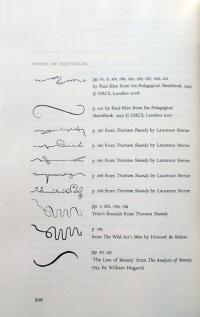The first book of literary criticism I’ve ever read with an index to squiggles just arrived: Adam Thirwell (born 1978), The Delighted States: a Book of Novels, Romances, & their Unknown Translators, Containing Ten Languages, Set on Four Continents, & Accompanied by Maps, Portraits, Squiggles, Illustrations, & a Variety of Helpful Indexes (New York: Farrar, Straus and Giroux, c2007). Firestone Library (F) PN3491 .T55 2007
It’s about time.
Professor Michael Wood’s review:
http://www.bookforum.com/
inprint/015_02/2467

Much has been written about how the man loves India, how he is deeply connected to the spirituality that pervades this country about how he has managed to transcend his lineage and made a name for himself as a painter. Still there are facets to the man that emerges after one meets him. Apart from his geniality and enthusiasm, his demeanor is that of someone truly interested in what you ask and proceeds to answer them to the best of his ability.
Olaf Van Cleef,Paris - France , descendant of the Van Cleef dynasty, son of Jack Van Cleef, counsellor on high range jewellery at Cartier, is hoping to make the transition from being a scion of a business empire to that of a painter who works with his heart. His work is a colourful mosaic of shapes and sizes -- pretty much like his own life and the different facets that he hopes will show from his impressions.
"My name means a lot to many people,'' he explains plaintively. "I have the family background, its history is rich and classy, no doubt. And there is a lot of appreciation because of that. But when I do something like this, I find my own place. This is when I would prefer to be disconnected with my background and family. Painting is a new life with no connections to the family name. I prefer to be just Olaf."
He says, "In my other world, my job is to do the maximum for beautiful ladies who want unique designs and jewellery. In such situations you don't do what you want, but what others want. You have to adapt your designs to suit people's taste. But when I paint, I am relaxed. There are no expectations. It allows me to be myself -- I am in my place! I am not Mr Van Cleef here."
When you see his work, the geometric shapes are interspersed with winding snakes and plump objects. The colours are brilliant like stones on a neckpiece. Yet they are crude in a childlike way to show the meandering of the spirit behind. When you ask him about the mosaic effect in his work he says with great flourish, "Mosaic is me, it's the personality of India, its different parts and the different parts of me. It's the variety of languages and traditions of India just as the 25 stones that are put strung together.''
Would people have noticed his paintings had he not been a Van Cleef? He laughs and says, "I think they will. My paintings are very special and interesting. I started out with my exhibitions without using the family name. For I know that if I did, people would come and say nice things to me but could poke fun behind my back. I know a lot of people in Mumbai, in Kolkata -- but in the South I don't. But I'm sure my paintings will be appreciated wherever I display them for what they are."
His grandfather, for being a Jew had taken refuge in the Taj of Mumbai between 1939 and '44, but went back too early -- early enough to be arrested and sent to the infamous Auschwitz. Olaf, who is not a stranger to India, has been visiting Mumbai from age of 14 with his grandmother.
His relationship with India he says is a big story. "I am a lover - of the people, the beauty, its history, everything. I feel like I am Pygmalion. Every time a visitor tells me something is not nice here, I get very arrogant with them. Every time someone says something negative, I feel angry.
Or if they keep saying India is poor, I say India is not like Bangladesh. It exports rice to Russia. But yes, life is hard but you will see that in 25 years it is going to be one of the most powerful countries in the world," and he laughs heartily at his own sense of loyalty to India. "But yes," he adds soberly, "Indians must have a sense of pride in their country and must monitor how the image is projected outside in the world. Don't keep taking pictures of women carrying pots on their heads and showing it to the rest of the world for them to say that there is no water in India. It may be very nice for a book but it not very nice you know.''
"I know I was here in my first life,'' he says gravely. "Otherwise how can I love this country so much? I seem to know everything about it. It is so special. I know when it is necessary to stay in my place. I am not an Ambassador of Cartier -- I am an Ambassador of India. I prefer this, as this is what is important to me."